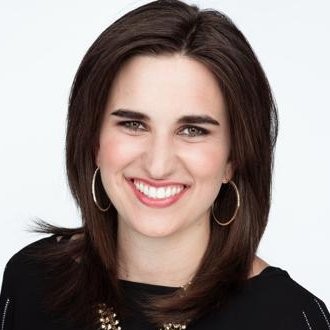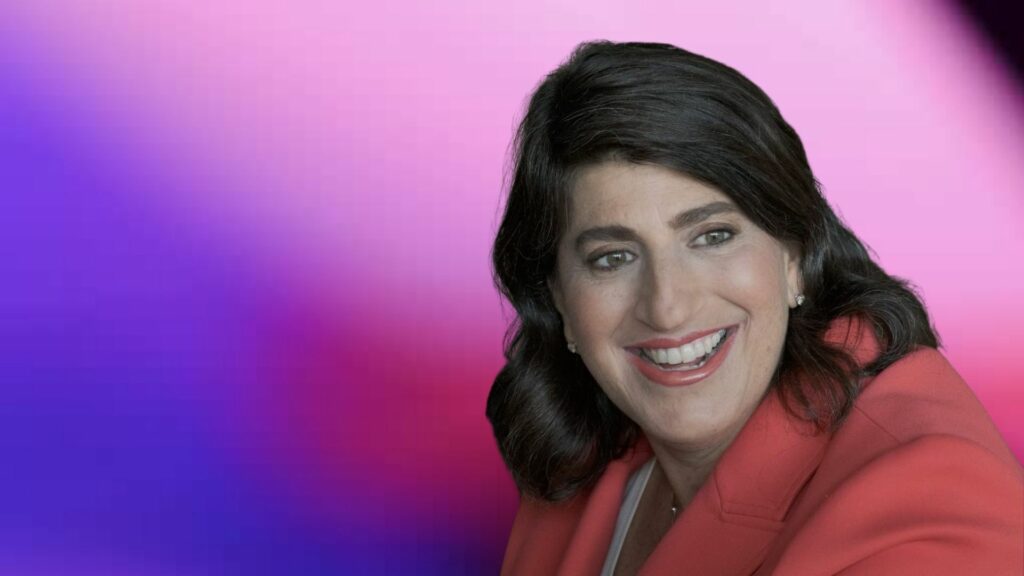PD Soros Fellow Jenna Nicholas on striving for a more sustainable world and the most powerful bschool tool

It’s not every day you hear a CEO discuss how their faith influences their business development, but for Jenna Nicholas – the co-founder and CEO of Impact Experience – it’s an important driver that keeps her motivated when her social impact work gets heavy.
“Darkness is the absence of light and one of the ways in which to cultivate the light is through putting one’s faith into action,” says Nicholas.

Taking action is something Nicholas is passionate about. She became part of the Bahá’í Faith during her formative years, a religion founded on the unity and equality of all people. It’s a lens she carries into every aspect of life, and as the child of immigrants from Iran and the United Kingdom, Nicholas decided early on to dedicate her career to social impact.
After graduating from Stanford University with an honors degree in International Relations, she returned in 2015 with the help of the P.D. Soros Fellowship which enabled her to complete an MBA at Stanford’s Graduate School of Business.
Just as P.D. Soros did for Nicholas; it has helped to shape the futures of close to a thousand immigrants since it was established 24 years ago, providing financial support and an extensive network that Nicholas describes as a group of people she can always rely on.
“The opportunity to practice bringing my full self and ancestry to my career, life and community,” reflects Nicholas, “is one that I greatly appreciate.”
Learn more about the program here, as well as eligibility requirements and the approaching October application deadline (find this and other scholarships inside MBAchic).
During business school, she co-founded Impact Experience to partner investors with marginalized communities to co-create solutions. Her goal? economic and racial justice for a better and more sustainable world.
From post-hurricane rebuilding efforts in New Orleans, Houston, and Puerto Rico, to workforce training programs in former coal economy-driven communities in West Virginia, building capital in people of color and women-run businesses, and supporting sustainable agriculture and climate practices, Impact Experiences is focused on partnering with underserved communities.
“We begin by building trust with communities,” explains Nicholas, “working with them to co-create solutions to their greatest challenges and carefully selecting a group of entrepreneurs, innovators and funders to accelerate their goals.”
Jenna is also the Managing Director of One Planet VC where she invests in early-stage businesses in transformative industries, such as education technology, marketplaces, media, and the future of mobility. Themes of equity and social impact weave throughout her career, at least 60% of the socially conscious companies she invests in are run by women and people of color.
Integral to her success? Becoming a P.D. Soros fellow, which connected her to countless other ambitious fellows, and offered her the transformative experience of business school.
“I think business school is a great place for the future women leaders of our world to find and be exposed to role models, peers and allies that will help them define and reach for the stars in their career.”
She shares her P.D. Soros story with MBAchic, how she stays encouraged while tackling heavy issues like structural racism, why her faith informs her work, and what she says is the most powerful business school tool.
MBAchic Q: How did being named a P.D. Soros fellow help you achieve your MBA goals, and what’s your advice to those interested in applying?
Jenna Nicholas: The PDSoros fellowship has been incredibly impactful to me through the opportunity to build relationships with a community of young change makers who are working to create a better community in service and in their careers. The fellowship helped me to achieve my career goals in a number of ways, including: (1) It helped to connect me with a group of amazing peers who I can rely on and have lifelong relationships with (2) It helped support me to go to my dream school, Stanford Business School (3) At each step in my career, the alumni events have helped to open doors to new opportunities. My advice to those applying is that this is a life changing experience and the process isn’t easy but it’s one of the most rewarding I’ve been through in my life.

MBAchic Q: Can you explain what the connection to others who share the immigrant experience meant to you in your academic pursuits and in your professional life since?
Jenna Nicholas: Hearing and carrying with me the stories of other immigrants to the United States from many countries around the world has given me a unique perspective that helps me feel as if I could overcome any obstacle. Furthermore, the opportunity to practice bringing my full self and ancestry to my career, life and community is one that I greatly appreciate. Sharing our experiences deeply creates a lifelong bond of collective service.
MBAchic Q: Based on your own journey as a Stanford School of Business MBA graduate, what is your top advice to other women who want to further their education/what do they need to know about business school?
Jenna Nicholas: One of the most powerful things about getting an MBA is that it is a platform to explore many different careers. As part of the Stanford MBA program, I was able to not only hone my understanding of business and economic models but also meet with leaders from venture capital, public equity and other corporate environments that enabled me to have a front row seat to the then nascent but fast growing industry of impact investing. During the MBA program, I met a number of other women leaders through networks such as Stanford Women on Boards, the Stanford Social Innovation Fellowship and the Stanford Center for Social Innovation. Hearing from these leaders inspired me to pursue roles such as a board member of Apollo’s new impact fund.
MBAchic Q: Impact Experience’s goals include improving equity, community participation, and climate resiliency. Can you talk about a current project you’re working on and what you think will be a critical focus in 2023 and beyond?
Jenna Nicholas: Impact Experience is currently working on a new initiative called Business for Climate Finance, helping leading companies to shift their bank deposits and 401k plans to more climate aligned investments, with a particular focus on racial and climate equity. This will be a key focus over the coming year, specifically given the need of corporate leaders to take action around climate change.
MBAchic Q: Many organizations try to get funding before establishing trust. Impact Experiences operates differently. Can you describe your process and method to fund underserved communities (people of color, women-run businesses, marginalized communities) and why it works to get access to game-changing capital?
Jenna Nicholas: We spend a lot of time upfront building deep relationships with the communities that we work with. Many funders start by defining their strategic objectives themselves and can often create challenges for communities that have not been included in shaping these priorities. Impact Experience’s model is different. We begin by building trust with communities, working with them to co-create solutions to their greatest challenges and carefully selecting a group of entrepreneurs, innovators and funders to accelerate their goals.
MBAchic Q: Tackling structural racism and prejudice is no small task in any political climate, but the work feels especially pressing at the current moment in history. What do you and your team do to keep the positive, “can-do” spirit you’ve mentioned – and what’s your advice for other orgs/individuals who want to make a difference in their community or improve their DEI efforts?
Jenna Nicholas: One of the inspirations for staying positive in the face of so much societal strife is to stay rooted in the aspirations and will of the community. Our team believes that it is a privilege to walk alongside a community as it defines its own pathway forward, overcoming the challenges of racism and climate injustice. Furthermore, in communities across the country, be it Williamson, West Virginia or Montgomery, Alabama, collaborating with communities that own their own destiny builds a long term resilience necessary for success. The lesson here is working alongside communities rather than in a disjointed way is the only way to achieve long term success.
MBAchic Q: You’ve said that a lot of the focus of your work is informed by your faith and the concept of work as a form of worship. I’m struck by how your work seems in line with the Baháʼí writing: “where there is love, nothing is too much trouble and there is always time.” Can you elaborate on what your faith has meant to you in your career and how it continues to shape the projects you pursue?
Jenna Nicholas: Yes, this is one of my favorite quotes! My faith, the Baha’i faith, is a rock in my life. Service is one of the core tenants in the Baha’i faith. We have no priests or clergy in the Baha’i Faith and see unity in diversity as a core principle. In other words, building bridges across racial divides and dismantling the structure of systematic racism is a great gift to be able to work on in repairing our world. As Baha’is, we believe that darkness is the absence of light and one of the ways in which to cultivate the light is through putting one’s faith into action.
MBAchic Q: What have been the greatest entrepreneurial lessons you’ve learned in your career so far?
Jenna Nicholas: A quotation that comes to mind is from Martin Luther King where he says ‘take the first step in faith, you don’t have to see the full staircase, just take the first step.’ It can often be overwhelming in entrepreneurship to think about all of the different options and pathways but there is a lot of power in just taking each step as it comes. One of the most important first steps in entrepreneurship is combining one’s passion with product / market fit. In reflecting on different opportunities, there is great power in thinking about the intersection of what will be impactful for the world, what one is passionate about and what people will pay for.
MBAchic Q: You said that mentorship has been a critical part of your process. Can you talk about the importance of mentorship and why more women should take the leap to dedicate time to elevating other more junior women?
Jenna Nicholas: I have had a number of mentors, both women and men, who have been profoundly important in both my life and career and I would highly recommend that others seek out mentors and always remember that it is a two way street, meaning that I try to find ways to support my mentors to reach their goals as well. We can all support each other on our journeys.

Photos from Jenna Nicholas and Impact Experience







